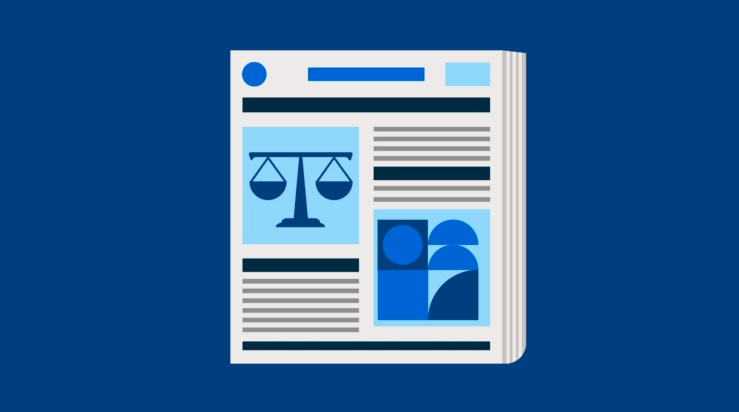In this fiercely competitive job market, where the number of law graduates and the movement of established lawyers is ever-increasing, the significance of a well-crafted legal cover letter cannot be overstated. Whether you’re a fresh graduate or a seasoned solicitor seeking a new challenge, your cover letter is your first opportunity to stand out.
There’s constant movement in the legal job market. The 2023 Legal Trends Report explored lawyer satisfaction and discovered lawyers in mid-sized firms are more than twice as likely to have left a job in 12 months than lawyers in smaller firms and five times more likely to be planning to leave a job in the next six months.
If you want a legal career, standing out from the crowd, irrespective of your starting point, is very important. It is essential to have a comprehensive understanding of how a well-crafted legal cover letter for lawyers will elevate your chances of being engaged in the role you seek, whether it’s a training contract, vacation scheme, paralegal position or lawyer.
Your legal cover letter must be persuasive, allowing you to present your case to the prospective employer. It’s your chance to articulate why you are the best fit for the role and set yourself apart from other applicants.
Read more: Tips for Writing a Successful Solicitor Resume [With Templates]
Legal cover letter examples
Many online resources help you create your legal cover letter and your CV. A quick search will uncover many options. However, be very careful when using these. Ensure you delete any Americanisms and change the style and language to be more in keeping with the UK.
There are a limited number of examples of UK cover letters for lawyers. However, two worthy of comment are from aspiring barrister Arooj Zahra Sheikh, who helped land eight mini-pupillages.
Eight excellent examples are on a Harvard University portal. They contain all the elements of an outstanding legal cover letter for lawyers—just remember to revise the US layout and terminology!
Use these samples as your crib sheet to craft excellent legal cover letters.

Understanding the basics of a legal cover letter
More than just a means of delivering your legal CV, your cover letter is your introduction. It’s the first thing your prospective employer will see and, most likely, read. Therefore, it’s crucial to structure it like a good story, with a compelling beginning, a detailed middle, and a strong end. If you do not spend the time and craft a compelling, professional legal cover letter, you may not have bothered applying for the job at all.
Your legal cover letter allows you to talk about yourself and the role you’re applying for and explain why you would be an ideal fit. It allows you to briefly outline your legal experience and skills and draw attention to the wealth of information in your CV, which you should always attach.
You may like these posts
Critical components of an effective legal cover letter
Structure your legal cover letter like a good story with a beginning, a middle and an end. Start with a strong opening, explaining who you are and why you are pursuing the position you are applying for. In the main body of your letter, expand on your legal qualifications and expertise. Keep it short; refer to your attached CV for more detailed information.
After outlining your legal qualifications and expertise, explain why your legal work experience, pro bono work, legal education, or specialisation in certain legal practice areas make you an excellent fit for the role. This is your chance to showcase your strengths and make the reader feel confident in your competence.
Your ending should express your belief you are the right candidate for the position. You must also invite the reader to get in touch with you to discuss the position further. Tell them here if you intend to follow up by phone or email with your prospective employer. Finally, thank them for their time and attention. A little gratitude can go a very long way.
What to include in your legal cover letter
The recipient’s address is one of the most crucial elements of your legal cover letter. Before you start writing, take the time to identify the recipient and their position. This allows you to address them personally in the opening salutation of your letter, a much more effective approach than the generic ‘Dear sir or madam’ or ‘To whom it may concern’. This personal touch can make the recipient feel valued and integral to your application process.
Your legal skills and legal experience are essential. Explain the stage you have reached in your legal career thus far and where you see your future in the law. Your future vision should align with the role on offer.
Next, explain why your experience to date, including any legal internships, makes you the ideal candidate for the position. Provide a brief overview of your current career. Include references to your academic and vocational journey, such as your law degree, LPC or SQE.
If you have been involved in an area relevant to the position offered, like legal research, legal analysis or legal writing, make sure you highlight that. Again, keep it brief. You can expand on your experience in your CV, but you must include enough information in your legal cover letter to encourage your prospective employer to read more.
As you approach the close of your cover letter, include why you are the ideal person for the advertised position. Include the phone number where someone can contact you. Most of all, say “thank you” for the opportunity.

Common mistakes to avoid in legal cover letters for lawyers
There are some critical “don’ts” when you prepare your legal cover letter.
- Never make fake claims about your qualifications or experience. If you’re successful, you’ll be quickly discovered – and probably sacked!
- Avoid the use of jargon. The recipient knows all about the jargon, and it won’t impress!
- Don’t over-promote. While the reader will want to know about your background, avoid writing lengthy passages about yourself. Over-promoting yourself can be off-putting and may disqualify you from consideration. Respect the reader’s time by being concise and to the point, ensuring that your cover letter is a respectful length.
- Don’t forget to focus on your suitability for the position. Failing to explain why you’re a perfect fit for the role will likely disqualify you from consideration, even if you have an impressive legal CV.
- Don’t waffle! Be clear, concise and to the point.
Additional tips for standing out
Nothing is worse than a prospective employer receiving a poorly worded, meandering, and grammatically flawed legal cover letter. Here are some tips to make sure your cover letter stands out:
- Use professional yet engaging language. This shows that you are competent and an excellent communicator.
- Do your homework on the law firm to whom you’re applying. Read their website and speak to anyone you know who works there, is a client, or has a professional relationship with them. Demonstrate your commercial awareness.
- If you have any awards or recognitions, make sure you mention them. These might be the deciding factor between two equally qualified candidates.
- Mention your competencies. If you excel at something relevant, mention it.
- Proofread and spellcheck your legal cover letter. This may seem common sense, but make sure your spell-check language settings are set to English (United Kingdom). You can even have MS Word read your letter to help you check for typos!
- Try to keep your letter to one A4 sheet.
- Make sure the font is large enough to read but not so large as to force a multiple-page letter—and don’t use Comic Sans!
- Use the same font in your legal CV as in your legal cover letter.
Final thoughts on how to write a legal cover letter for lawyers
In a crowded legal job market, there’s no better way to outshine the competition than an excellent legal cover letter. Ensure you’re putting your best foot forward with your future employer by:
- Making it personal. Customise your cover letter at every step to the firm you’re applying to—from the tone to the specific skills you detail.
- Keeping it brief. Cover letters for lawyers are a one-page summary to let your prospective employer know that you’re a candidate they should talk to further. You want to give them enough information to draw them in but not overwhelm them and risk losing interest.
- Showcasing your strengths. Focus on the positives, and don’t be afraid to highlight how your past experiences make you uniquely qualified.
While finding a new legal job in a competitive market isn’t exactly easy, staying resilient and adaptive will lead you to success. By crafting a great cover letter, you’re more likely to be noticed in this—and any—job market. And, no matter what job you’re applying for, knowing technology can help set you apart—both when job hunting and once you’re working at your new firm.
If you’re a law student and want a head start, you may be able to get free Clio access via Clio’s Academic Access Program (CAAP) at your law school. Learn more about CAAP here.
Legal Cover Letter FAQs
Do law firms read cover letters?
In a competitive job market, hiring managers at law firms read cover letters to help determine which candidates may be the best fit. A well-written legal cover letter can entice the reader to review your resume—and, hopefully, invite you for an interview—by showcasing how your experience and skills align with the role.
We published this blog post in October 2024. Last updated: .
Categorized in: Business
Your Free Guide to Starting Your Own Law Firm
With information on everything you need to consider when setting up a law firm, it will give you the tools you need to get your new law firm started.
Download Now







